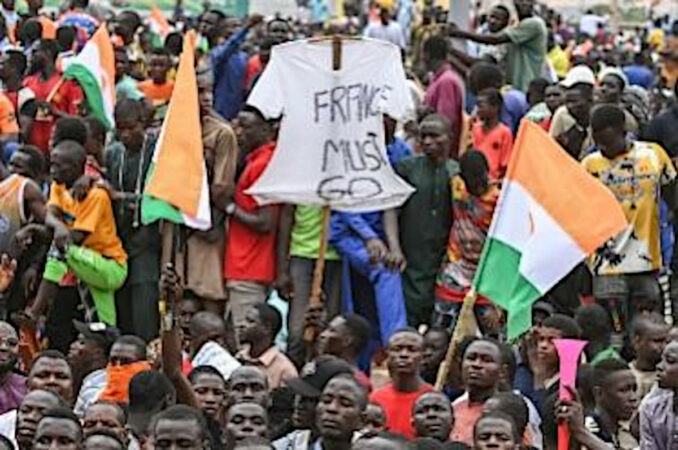Mali, Burkina Faso and Niger join to defend sovereignty
The author, a former member of the Secretariat of the African Party for the Independence of Guinea-Bissau and Cape Verde (PAIGC), writes of African events for Avante!, the newspaper of the Portuguese Communist Party. Translation: John Catalinotto.
The people and government of Niger have celebrated France’s decision to agree to withdraw its troops and diplomats from the West African country, as has been repeatedly demanded by the local authorities.

Mass demonstration in Niamey, Niger says, “France must go!”
Paris announced that the French troops, around 1,500 strong, as well as the ambassador and all French diplomatic staff, will leave Niger “in an organized manner” before the end of 2023.
In Niamey, the government called the French withdrawal a “new step towards sovereignty,” a “historic moment” that bears witness to the “determination and will of the Nigerien people.” It warned that “imperialist and neo-colonialist forces are now unwelcome” in Niger.
Stressing that a “new era of cooperation, based on mutual respect and sovereignty” is already underway, Niger canceled its military agreements with France and maintained the ban on French planes flying over Nigerien airspace, which is still open to national and international commercial flights.
A country rich in uranium and other mineral resources, which for decades have been exploited by foreign companies without benefit to the people, Niger is home to French and U.S. military bases and troops. Washington announced a few days ago that it is “evaluating” its military “cooperation” with the country’s new government, particularly with regard to its air base in Agadez, one of the largest in Africa.
At the end of July, the Nigerien military ousted President Mohamed Bazoum, a staunch ally of France, and seized power, citing the “continuing deterioration of the security situation” and “poor economic and social governance.” They formed the National Council for the Safeguarding of the Homeland, headed by General Omar Tchiani, who then took over as “transitional president.”
Since then, France and the Economic Community of West African States (ECOWAS) have exerted economic and diplomatic pressure and threatened to intervene militarily in Niger to “restore constitutional order,” but have failed to carry out their threats. The positions taken by several countries in the region, opposed to external interference and any possible foreign aggression, contributed to this.
At the time, Mali and Burkina Faso, both governed by the military and which had previously expelled French troops from their territories, firmly allied themselves with Niger.
Recently, during the United Nations General Assembly, Burkina Faso’s Minister of State, Bassolma Bazie, denounced the fact that his country, like Mali and Niger, was involved in the Sahel “in a war dictated by imperialism” under the guise of “fighting terrorism.” He explained that the three countries, with common borders, have established a collective defense and mutual assistance pact, called the Alliance of Sahel States, “to take our destiny into our own hands.”
Bazie emphasized that, “We say no to all those so-called friends who claim to want our supposed well-being or who threaten us with war in order to impose their friendship.” The Burkinabe leader also expressed the opinion that ECOWAS, the African Union and the United Nations should act for the benefit of the peoples and not be structures controlled by a “global minority.

